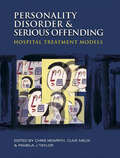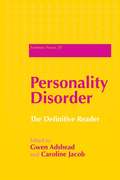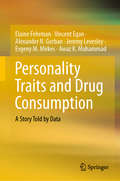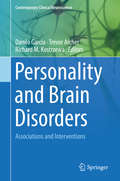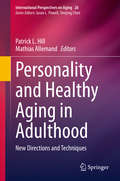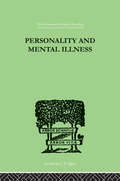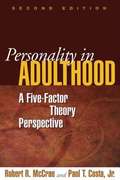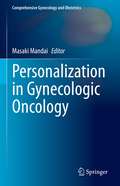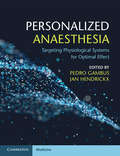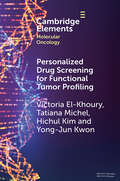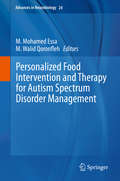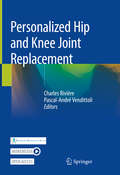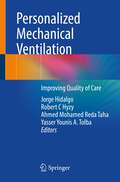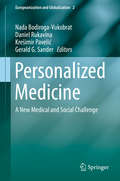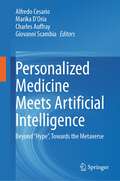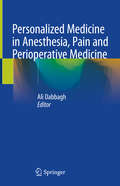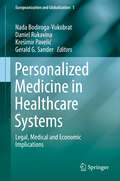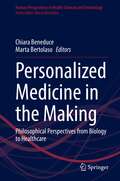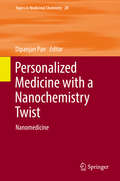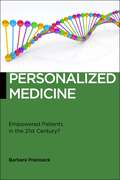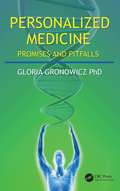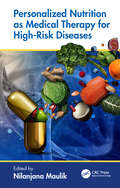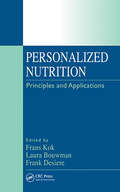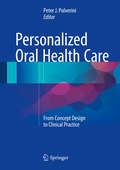- Table View
- List View
Personality Disorder and Serious Offending: Hospital treatment models
by Pamela Taylor Christopher Newrith Clive MeuxPeople with personality disorder who offend tend to be neglected by health services in most countries. In the UK, there has been renewed interest in the field since government initiatives in the end of the 1990s. Government proposals themselves are controversial, but there is growing recognition that it is unsafe, both for the general public and fo
Personality Disorder: The Definitive Reader
by Gwen Adshead Kingsley Norton Robert Hinshelwood Caroline JacobA Personality Disorder Reader offers a comprehensive and accessible collection of papers that will be practically useful to practitioners working in secure and non-secure settings with patients who have personality disorders. This book brings together fourteen classic papers, which address the impact that working with personality disorder patients can have on staff. It also offers theoretical explanations for personality disorder, and explores other issues such as the concept of boundaries in clinical practice, psychiatric staff as attachment figures and the relationship between severity of personality disorder and childhood experiences. Each paper is introduced with contextual material, and is followed by a series of questions that are intended to be used as educational exercises. This book will be essential reading for clinical and forensic psychologists, psychiatrists, community psychiatric nurses, social workers and students.
Personality Traits and Drug Consumption: A Story Told by Data (SpringerBriefs in Statistics)
by Alexander N. Gorban Jeremy Levesley Elaine Fehrman Vincent Egan Evgeny M. Mirkes Awaz K. MuhammadThis book discusses the psychological traits associated with drug consumption through the statistical analysis of a new database with information on 1885 respondents and use of 18 drugs. After reviewing published works on the psychological profiles of drug users and describing the data mining and machine learning methods used, it demonstrates that the personality traits (five factor model, impulsivity, and sensation seeking) together with simple demographic data make it possible to predict the risk of consumption of individual drugs with a sensitivity and specificity above 70% for most drugs. It also analyzes the correlations of use of different substances and describes the groups of drugs with correlated use, identifying significant differences in personality profiles for users of different drugs. The book is intended for advanced undergraduates and first-year PhD students, as well as researchers and practitioners. Although no previous knowledge of machine learning, advanced data mining concepts or modern psychology of personality is assumed, familiarity with basic statistics and some experience in the use of probabilities would be helpful. For a more detailed introduction to statistical methods, the book provides recommendations for undergraduate textbooks.
Personality and Brain Disorders: Associations and Interventions (Contemporary Clinical Neuroscience)
by Richard M. Kostrzewa Trevor Archer Danilo GarciaBrain disorders (neurodevelopmental, neurodegenerative, and affective disorders) can be investigated, treated, and prevented using person-centered methods. Because researchers have not reached a clear consensus on whether or not personality is stable or changeable, it has been difficult to outline how to use these methods in the care of people with brain disorders. Thus, the first part aims to identify the ways in which brain disorders and personality are linked. The second part explores different person-centered approaches that can be incorporated in a healthcare or education setting to help people with various brain disorders and to promote physical, mental and social health. The third part focuses on challenges and new venues.
Personality and Healthy Aging in Adulthood: New Directions and Techniques (International Perspectives on Aging #26)
by Patrick L. Hill Mathias AllemandThis book highlights international efforts to better understand the role of individual differences in healthy aging by exploring new directions, methods, and questions within the field. The book considers how to measure personality and personality change during adulthood, the associations between personality and healthy aging outcomes over time, and the role of personality in building interventions to promote healthy aging. The first section considers the value of personality constructs for healthy aging outcomes beyond the broad Big Five personality dimensions. It discusses the role of attachment, purpose, and affect, and also touches on the issue of psychopathology. The second section presents innovative assessment methods, research designs beyond classical longitudinal approaches, as well as sophisticated and integrative techniques for analyzing personality change processes. The third section raises new important questions, such as how interventionists from non-personality domains can incorporate personality processes in their intervention programs. It also discusses how different domains of individual functioning may interact in concert to predict healthy aging outcomes, as well as how more integrative lifespan models of healthy aging may advance research on personality and healthy aging. Overall, this book will spark interest and chart new directions for researchers, practitioners and interventionists in healthy aging, gerontology and applied fields.
Personality and Mental Illness: An Essay in Psychiatric Diagnosis (International Library Of Psychology)
by Bowlby, JohnFirst published in 1999. Routledge is an imprint of Taylor & Francis, an informa company.
Personality and Psychopathology
by Jennifer L. Tackett Robert F. KruegerTraditionally, personality and psychopathology have been distinct areas of inquiry. This important volume reviews influential research programs that increasingly bridge the gap between the two areas. Presented are compelling perspectives on whether certain personality traits or structures confer risks for mental illness, how temperament interacts with other influences on psychological adaptation, links between personality disorders and mood and anxiety disorders, implications for effective intervention, and more.
Personality in Adulthood, Second Edition
by Robert T. Costa Jr. Robert R. MccraeThis influential work examines how enduring dispositions or traits affect the process of aging and shape each individual's life course. From two well-known authorities in the field, the volume is grounded in a growing body of empirical evidence. Critically reviewing different theories of personality and adult development, the authors explain the logic behind the scientific assessment of personality, present a comprehensive model of trait structure, and examine patterns of trait stability and change after age 30, incorporating data from ongoing cross-sectional and longitudinal studies. Written in a clear, jargon-free style, this book is an ideal text for advanced students and a timely reference for researchers and clinicians.
Personalization in Gynecologic Oncology (Comprehensive Gynecology and Obstetrics)
by Masaki MandaiThis book thoroughly illustrates the designed and tailored medical approaches for tumors of the female reproductive organ. The chapters explore different cancer species such as ovarian cancer, endometrial cancer, cervical cancer, etc. Various treatment modalities such as immunotherapy and histotype-specific treatment are delivered, and it offers a chapter on how genome-wide analysis contributes to personalized treatment. It is essential to understand this concept because many molecular target drugs and the prevalence of genome-based analysis in clinical settings have enabled us to introduce valid precision medicine in the field of gynecologic oncology. Chapters explain the stream of transition from conventional standardized treatment to personalized treatment and address future perspectives.Personalization Gynecologic Oncology is a well-designed source for beginning to advanced oncologists, gynecologists, geneticists, genetic counselors, and nurses. Offering the latest treatment strategies, the Editor hopes the ideas presented here will be a foundation for further development in the field.
Personalized Anaesthesia: Targeting Physiological Systems for Optimal Effect
by Pedro L. Gambús Hendrickx Jan F. A.Personalized Anaesthesia presents a modern vision of anaesthesia. Integrating technology and knowledge from leading experts in the field, this book will change the way anaesthesia is both taught and practiced. Modern practice requires the anaesthetist to provide patient-specific management. This is the first resource to be organised by the desired physiological effect, rather than by drug groupings, explaining how physiological changes can be produced and controlled according to the characteristics of each patient and the particular surgical context. The book integrates physiology, pharmacology and technology, and applies these concepts in a systematic manner to each homeostatic system. This will optimise drug titration, effect quantification and decision making in anaesthesia practice to match the needs of the individual patient. Complex mathematical and scientific concepts are explained using accessible text, colour illustrations throughout and graphs. This is an essential text for any consultant or trainee working in anaesthesia.
Personalized Drug Screening for Functional Tumor Profiling (Elements in Molecular Oncology)
by Victoria El-Khoury Tatiana Michel Hichul Kim Yong-Jun KwonDespite considerable advances in our understanding of the biology that underlies tumor development and progression of cancer and the rapidly evolving field of personalized medicine, cancer is still one of the deadliest diseases. Many cancer patients have benefited from the survival improvements observed with targeted therapies but only a small subset of patients receiving targeted drugs experience an objective response. Because cancer is a complex and heterogeneous disease, the search for effective cancer treatments will need to address not only patient-specific molecular defects but also aspects of the tumor microenvironment. The functional tumor profiling directly measures the cellular phenotype, in particular tumor growth, in response to drugs using patient-derived tumor models and might be the next step toward precision oncology. In this Element, the authors discuss the personalized drug screening as a novel patient stratification strategy for the determination of individualized treatment choices in oncology.
Personalized Food Intervention and Therapy for Autism Spectrum Disorder Management (Advances in Neurobiology #24)
by M. Mohamed Essa M. Walid QoronflehThe book focuses on implications of traditional and processed foods for autism spectrum disorder (ASD) intervention and management. Numerous phytonutrients and pharmacologically active compounds in edible natural products and diet could influence and offer protection to neuronal dysfunction that occurs due to ASD. The neuroprotective effects of various fruits, vegetables, nuts and seeds phytochemicals, and other natural bioactive ingredients against ASD and related conditions are discussed. Topics such as the possible neuroprotective mechanism of action of these foods and the therapeutic role of antioxidants in relation to ASD are addressed. This book also highlights the scope of using anti-inflammatory agents and antioxidants to promote neurogenesis and improve other symptoms in ASD. It emphasizes personalized nutritional approaches with dietary management of neurodevelopmental disorders/ASD cases. Information in this book is relevant to researchers in the field of complementary and alternative medicine, nutraceuticals, neuroscience, agriculture, nutrition, and food science. This volume is beneficial to students of varying levels, and across multiple disciplines.
Personalized Hip and Knee Joint Replacement
by Charles Rivière Pascal-André VendittoliThis open access book describes and illustrates the surgical techniques, implants, and technologies used for the purpose of personalized implantation of hip and knee components. This new and flourishing treatment philosophy offers important benefits over conventional systematic techniques, including component positioning appropriate to individual anatomy, improved surgical reproducibility and prosthetic performance, and a reduction in complications. The techniques described in the book aim to reproduce patients’ native anatomy and physiological joint laxity, thereby improving the prosthetic hip/knee kinematics and functional outcomes in the quest of the forgotten joint. They include kinematically aligned total knee/total hip arthroplasty, partial knee replacement, and hip resurfacing. The relevance of available and emerging technological tools for these personalized approaches is also explained, with coverage of, for example, robotics, computer-assisted surgery, and augmented reality. Contributions from surgeons who are considered world leaders in diverse fields of this novel surgical philosophy make this open access book will invaluable to a wide readership, from trainees at all levels to consultants practicing lower limb surgery
Personalized Mechanical Ventilation: Improving Quality of Care
by Jorge Hidalgo Robert C Hyzy Ahmed Mohamed Reda Taha Yasser Younis A. TolbaIn dealing with the unprecedented COVID-19 pandemic, there are an increased number of patients requiring personalized management as the disease pathology varies. With variable lung compliance and airway resistance as well as the severity of the disease, one size will not fit all patients. This book is problem-oriented with evidence-based discussions of the daily encountered scenarios in the ICU for mechanically ventilated patients, dealing with the pathology, monitoring and troubleshooting facing intensivists daily. These scenarios are managed utilizing a goal-directed approach and algorithms to achieve these goals. All chapters contain an explanation of a different solution illustrating the respiratory mechanics, physiology and pathology involved in such a scenario. Each chapter also closes with a take-home message to summarize the content. In addition to describing the ventilation of different patient categories, this text also features ventilation cases specific to COVID-19 including airway management in the enhanced air born isolated patient, pulmonary embolism, different states of shock and differential lung ventilation. There is also a specific chapter on monitoring mechanical ventilation with point of care ultrasound, which is an available modality in most ICUs. Another unique chapter describes how to connect more than one patient to one ventilator in case of a shortage of machines. Written by experts in the field, Personalized Mechanical Ventilation is a timely and valuable resource for critical care physicians, nurses and respiratory therapists on the front lines of both COVID-19 and day-to-day care of mechanically ventilated patients in the ICU.
Personalized Medicine
by Nada Bodiroga-Vukobrat Daniel Rukavina Krešimir Pavelić Gerald G. SanderThis book offers comprehensive coverage of the various aspects of personalized medicine as an original approach to classifying, understanding, treating and preventing disease based on individual biological differences. In the introductory section, it defines personalized medicine as a way toward new medical practices and addresses the question: What can personalized medicine offer citizens, medical professionals, reimbursement bodies and stakeholders? Subsequent chapters discuss the technological aspects of personalized medicine: data collection, comprehensive integration and handling of data, together with key enabling factors in developing the requisite technological support for personalized medicine. Lastly, the book explores the main issues shaping the implementation and development of personalized medicine - education, stakeholder participation, infrastructure, a new approach to the classification of disease and medical tests, regulatory frameworks, and new reimbursement models - together with ethical, legal and social issues. Ultimately, the book calls for interdisciplinarity and a radical change in the way we approach the health and wellbeing of individuals. Target groups are medical doctors and researchers in the field of biomedicine, as well as experts from the social sciences dealing with legal, economic and social aspects of health system issues in general. Though the book will primarily benefit these groups of professional experts, its content will also appeal to a far wider readership, as it deals with a paradigm shift in one of society's main pillars - the health system.
Personalized Medicine Meets Artificial Intelligence: Beyond “Hype”, Towards the Metaverse
by Alfredo Cesario Marika D’Oria Charles Auffray Giovanni ScambiaThe book provides a multidisciplinary outlook on using Artificial Intelligence (AI)-based solutions in the field of Personalized Medicine and its transitioning towards Personalized Digital Medicine.The first section integrates different perspectives on AI-based solutions and highlights their potential in biomedical research and patient care. In the second section, the authors present several real-world examples that demonstrate the successful use of AI technologies in various contexts. These include examples from digital therapeutics, in silico clinical trials, and network pharmacology. In the final section of the book, the authors explore future directions in AI-enhanced biomedical technologies and discuss emerging technologies such as blockchain, quantum computing and the “metaverse”. The book includes discussions on the ethical, regulatory, and social implications for an AI-based personalized medicine. The integration of heterogeneous disciplines brings together multiple stakeholders and decision makers involved in the personalization of care. Clinicians, students, and researchers from academia and the industry can benefit from this book, since it provides foundational knowledge to drive advances in personalized biomedical research and health care.
Personalized Medicine in Anesthesia, Pain and Perioperative Medicine
by Ali DabbaghThis book discusses the current and future impact of cellular and molecular medicine (CMM) on anesthesiology and perioperative medicine. It covers the topic from a translational perspective and describes the relevance of CMM to daily clinical practice. Taking a bench-to-bedside approach, chapters examine topics including perioperative acute and chronic management, perioperative organ protection, and novel pharmaceuticals. Personalized Medicine in Anesthesia, Pain and Perioperative Medicine is aimed at anesthesiologists and pain physicians, and will also be of interest to pharmacists and those working in cellular and molecular medicine.
Personalized Medicine in Healthcare Systems: Legal, Medical and Economic Implications (Europeanization and Globalization #5)
by Nada Bodiroga-Vukobrat Daniel Rukavina Krešimir Pavelić Gerald G. SanderThis book gathers scientific contributions on comprehensive approaches to personalized medicine. In a systematic and clear manner, it provides extensive information on the methodological, technological, and clinical aspects of high-throughput analytics, nanotechnology approaches, microbiota/human interactions, in-vitro fertilization and preimplantation, and various diseases like cancer.Moreover, the book analyzes the social and legal aspects of social security systems, healthcare systems and EU law – e.g. the role of solidarity, regulatory possibilities and obstacles, justice and equality, privacy/disclosure of data, and the right to know – from an interdisciplinary perspective. Lastly, it explores the economical and ethical context in the fields of business models, intellectual property issues, the patient/physician relationship, and price discrimination.
Personalized Medicine in the Making: Philosophical Perspectives from Biology to Healthcare (Human Perspectives in Health Sciences and Technology #3)
by Marta Bertolaso Chiara BeneduceThis book offers a multidisciplinary look at the much-debated concept of “personalized medicine”. By combining a humanistic and a scientific approach, the book builds up a multidimensional way to understand the limits and potentialities of a personalized approach in medicine and healthcare. The book reflects on personalized medicine and complex diseases, the relationship between personalized medicine and the new bio-technologies, personalized medicine and personalized nutrition, and on some ethical, political, economic, and social implications of personalized medicine. This volume is of interest to researchers from several disciplines including philosophy, bio-medicine, and the social sciences.
Personalized Medicine with a Nanochemistry Twist
by Dipanjan PanMedicinal chemistry is both science and art. The science of medicinal chemistry offers mankind one of its best hopes for improving the quality of life. The art of medicinal chemistry continues to challenge its practitioners with the need for both intuition and experience to discover new drugs. Hence sharing the experience of drug research is uniquely beneficial to the field of medicinal chemistry. Drug research requires interdisciplinary team-work at the interface between chemistry, biology and medicine. Therefore, the topic-related series Topics in Medicinal Chemistry covers all relevant aspects of drug research, e. g. pathobiochemistry of diseases, identification and validation of (emerging) drug targets, structural biology, drugability of targets, drug design approaches, chemogenomics, synthetic chemistry including combinatorial methods, bioorganic chemistry, natural compounds, high-throughput screening, pharmacological in vitro and in vivo investigations, drug-receptor interactions on the molecular level, structure-activity relationships, drug absorption, distribution, metabolism, elimination, toxicology and pharmacogenomics. In general, special volumes are edited by well known guest editors.
Personalized Medicine: Empowered Patients in the 21st Century? (Biopolitics #7)
by Barbara PrainsackInside today's data-driven personalized medicine, and the time, effort, and information required from patients to make it a realityMedicine has been personal long before the concept of “personalized medicine” became popular. Health professionals have always taken into consideration the individual characteristics of their patients when diagnosing, and treating them. Patients have cared for themselves and for each other, contributed to medical research, and advocated for new treatments. Given this history, why has the notion of personalized medicine gained so much traction at the beginning of the new millennium? Personalized Medicine investigates the recent movement for patients’ involvement in how they are treated, diagnosed, and medicated; a movement that accompanies the increasingly popular idea that people should be proactive, well-informed participants in their own healthcare.While it is often the case that participatory practices in medicine are celebrated as instances of patient empowerment or, alternatively, are dismissed as cases of patient exploitation, Barbara Prainsack challenges these views to illustrate how personalized medicine can give rise to a technology-focused individualism, yet also present new opportunities to strengthen solidarity. Facing the future, this book reveals how medicine informed by digital, quantified, and computable information is already changing the personalization movement, providing a contemporary twist on how medical symptoms or ailments are shared and discussed in society. Bringing together empirical work and critical scholarship from medicine, public health, data governance, bioethics, and digital sociology, Personalized Medicine analyzes the challenges of personalization driven by patient work and data. This compelling volume proposes an understanding that uses novel technological practices to foreground the needs and interests of patients, instead of being ruled by them.
Personalized Medicine: Promises and Pitfalls
by Gloria GronowiczPersonalized Medicine: Promises and Pitfalls broadly explores the tailoring of medical treatment to a patient‘s characteristics, needs, and preferences during all stages of care, including prevention, diagnosis, treatment, and follow-up.The book‘s goal is to explain the science behind personalized medicine, what impact it may have on specific disea
Personalized Nutrition as Medical Therapy for High-Risk Diseases
by Nilanjana MaulikPersonalized nutrition involves the formulation of individualized nutritional recommendations to promote and maintain health based on an individual's genetic makeup and other unique intrinsic and extrinsic factors. Implementing personalized nutrition plans for individuals with certain diseases or who are in danger of developing health conditions could help control the onset and severity of symptoms. Personalized Nutrition as Medical Therapy for High-Risk Diseases offers a practical guide for physicians seeking to provide tailored dietary recommendations to their patients with disease treatment, modulation and prevention in mind. The book focuses on the biological mechanisms of specific diseases and provides evidence for how personalized nutrition positively impacts them. It explores conditions including cardiovascular diseases, hypertension, hypercholesteromia, diabetes, obesity, Crohn's disease, as well as multiple pediatric, renal and psychological disorders. Features: · Includes case studies that document how people respond differently towards food depending on their genetic structure and other factors. · Discusses genome wide association studies (GWIMS) to understand the interplay between genetic susceptibility and dietary interactions. · Provides users information to effectively implement personalized nutrition into practice. · Identifies possible challenges to the implementation of personalized nutritional interventions in a clinical setting. This book is for medical practitioners and will also appeal to researchers and students.
Personalized Nutrition: Principles and Applications
by Frans Kok Laura Bouwman Frank DesiereFrom one person to the next, optimal health is governed by a huge array of minor genetic differences. When modulated by a variety of food bioiactives, these differences result in changes in gene expression and subsequent phenotypic expression. Combining biomedical and social science with contributions from leaders in both fields, Personalized Nutri
Personalized Oral Health Care
by Peter J. PolveriniThis book provides an overview of the oral health care environment as the transition is made to a system increasingly focusing on disease prevention, early intervention to minimize disease progression, and a personalized approach that meets each individual's needs. Descriptions are provided of an array of technologies based on rapid advances in genomic medicine and omics technology that are already entering clinical practice and promise to have a huge impact on risk assessment, diagnosis, and therapy. Detailed consideration is also paid to personalized health insurance in the new environment, the impact of personalized health care on the economics of health care, and the consequences for the global diagnostic market place and improved access to care. The changes in dental education required to produce dentists better equipped to participate in the new health care environment are examined, and the book concludes by considering key opportunities and challenges.
